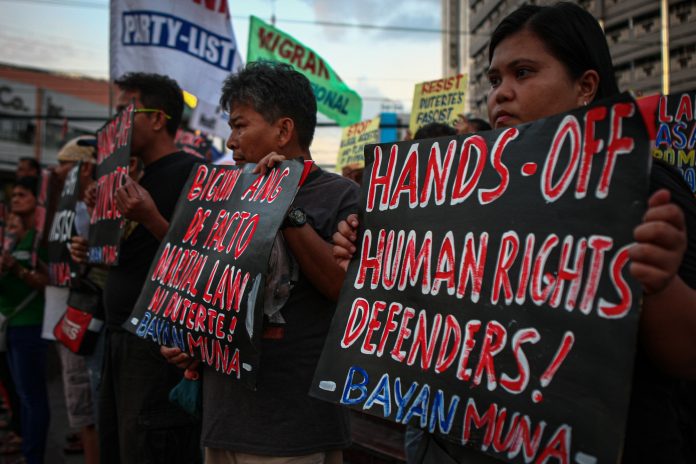Will the Duterte administration even acknowledge the 104-page report of the Commission on Human Rights detailing how it has legitimized violence against human rights defenders (HRDs) in the country?
We’re quite sure it would go straight to the trash can in Malacañan Palace, the seat of executive power.
Why? The report minces no words and directly points an accusing finger at the president himself for the dire situation of human rights defenders for the past four years.
We quote the report at length to show that the CHR feels really disgusted over the turn of events in the country in so far as human rights are concerned.
“The prevailing climate of impunity in the context of violence against HRDs is largely attributable to the pronouncements of the President.
“The President through his pronouncements (has) created a dangerous fiction that it is legitimate to hunt down and commit atrocities against HRDs because they are enemies of the state.
“Extreme supporters of Mr. Duterte also contribute to the hostile environment in the country for human rights workers, since these supporters demonize the concept of human rights and HRDs.”
The report enumerated Duterte’s most damaging public statements against human rights advocates.
- One, he does not care about human rights.
- Two, HRDs should be blamed if the country’s drug problem worsens.
- Three, HRDs should be shot if they obstruct justice.
- Four, he will investigate human rights groups for conspiracy.
- Five, lawyers defending drug suspects will be the next target of his war on drugs.
- And six, he will target left-wing groups as they are communist fronts.
The agency pointed out how the Duterte administration has twisted the concept of human rights to make it appear that HRDs are protectors of criminals.
The CHR cited instances of “Red-tagging” and public vilification of rights workers, constant profiling and surveillance of HRDs, the militarization of the government, and the worsening culture of impunity in the country.
“These acts largely remain unabated and HRDs are oftentimes left without any remedy to protect themselves.”
The report also found that the Duterte administration “purposely engages in acts that frustrate the fulfillment of the rights provided [in the United Nations Declaration on Human Rights Defenders].”
The conclusion of the constitutional body specifically tasked to monitor the human rights situation in the country is that there is a “systematic attack” against rights defenders across all sectors of civil society in the Philippines.
We’re also quite sure that the current political dispensation will not take all this sitting down.
We take note that in the wake of the CHR’s stand against what appeared to be the climate of impunity in the government’s war on illegal drugs, administration allies in Congress moved to reduce the agency’s budget to 1 peso.
The net effect of this, as we know, would have been to abolish it. But for one reason or another, the proposed budget of the agency was restored, as the proposed one-peso annual budget would have shown beyond doubt that it was in reprisal against the agency’s unwavering position on fully implementing its mandate under the fundamental law.
The CHR report validates what the United Nations Human Rights Council and international human rights groups have been saying all along: that the Philippine government has thrown all human rights guarantees in the 1987 Constitution out of the window since 1986, and imperiled the safety and security of all those trying to defend those rights.
As we see it, the report should also serve as input in the International Criminal Court’s ongoing move to gather evidence on alleged human rights violations under the Duterte administration prior to a full-fledged probe.
The CHR is on the right track in insisting on the Philippine government’s strict compliance with human rights standards.
It has the full support of the international community—or at least the freedom-loving nations—in its mandate to uphold human rights that Filipinos have long fought for even under the yoke of dictatorship and outright repression.
Ernesto M. Hilario writes on political and social justice issues for various publications in the Philippines. The views and opinions expressed in this article are those of the author and do not necessarily reflect the official editorial position of LiCAS.news.









